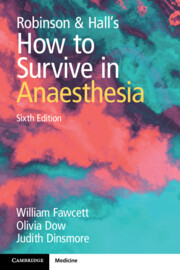Book contents
- Robinson & Hall’s How to Survive in Anaesthesia
- Robinson & Hall’s How to Survive in Anaesthesia
- Copyright page
- Contents
- Figures
- Tables
- Boxes
- Foreword
- Preface to the Sixth Edition
- Preface to the Fifth Edition
- Preface to the Fourth Edition
- Preface to the Third Edition
- Preface to the Second Edition
- Preface to the First Edition
- Abbreviations
- Let’s Start at the Very Beginning …
- Section 1 Nuts and Bolts
- Section 2 Crises and Complications
- Section 3 Passing the Gas
- Chapter 22 Preoperative Evaluation and Preparation
- Chapter 23 General Principles of Emergency Anaesthesia
- Chapter 24 Emergency Laparotomy
- Chapter 25 Anaesthesia for Minimally Invasive Surgery
- Chapter 26 Anaesthesia for Abdominal Surgery
- Chapter 27 Anaesthesia for Gynaecological Surgery
- Chapter 28 Anaesthesia for Urological Surgery
- Chapter 29 Anaesthesia for Maxillofacial and ENT Surgery
- Chapter 30 Anaesthesia for Orthopaedic Surgery
- Chapter 31 Anaesthesia for Day Case Surgery
- Chapter 32 Epidural and Spinal (Neuraxial) Anaesthesia
- Chapter 33 Common Regional Blocks
- Chapter 34 Obstetric Anaesthesia
- Chapter 35 Anaesthesia in the Corridor
- Section 4 Walking the Walk (and Talking the Talk)
- Section 5 And Finally …
- Index
Chapter 24 - Emergency Laparotomy
from Section 3 - Passing the Gas
Published online by Cambridge University Press: 09 June 2025
- Robinson & Hall’s How to Survive in Anaesthesia
- Robinson & Hall’s How to Survive in Anaesthesia
- Copyright page
- Contents
- Figures
- Tables
- Boxes
- Foreword
- Preface to the Sixth Edition
- Preface to the Fifth Edition
- Preface to the Fourth Edition
- Preface to the Third Edition
- Preface to the Second Edition
- Preface to the First Edition
- Abbreviations
- Let’s Start at the Very Beginning …
- Section 1 Nuts and Bolts
- Section 2 Crises and Complications
- Section 3 Passing the Gas
- Chapter 22 Preoperative Evaluation and Preparation
- Chapter 23 General Principles of Emergency Anaesthesia
- Chapter 24 Emergency Laparotomy
- Chapter 25 Anaesthesia for Minimally Invasive Surgery
- Chapter 26 Anaesthesia for Abdominal Surgery
- Chapter 27 Anaesthesia for Gynaecological Surgery
- Chapter 28 Anaesthesia for Urological Surgery
- Chapter 29 Anaesthesia for Maxillofacial and ENT Surgery
- Chapter 30 Anaesthesia for Orthopaedic Surgery
- Chapter 31 Anaesthesia for Day Case Surgery
- Chapter 32 Epidural and Spinal (Neuraxial) Anaesthesia
- Chapter 33 Common Regional Blocks
- Chapter 34 Obstetric Anaesthesia
- Chapter 35 Anaesthesia in the Corridor
- Section 4 Walking the Walk (and Talking the Talk)
- Section 5 And Finally …
- Index
Summary
Emergency laparotomy is an extension of the principles outlined in chapter 23. However,
patients presenting for emergency laparotomy have historically had poor outcomes due to a number of factors such as delay in surgery, imaging and antibiotics, poorly supervised junior staff, poor monitoring and low numbers of intensive care beds to deliver postoperative care. Many of these issues have been addressed and morbidity and mortality as fallen substantially.
Perioperatively these patients may have ongoing significant physiological derangement requiring fluids, blood, and inotropes, as well as high inspired oxygen. The use of arterial and central lines is much more common. Patients at high risk may require intensive care postoperatively too.
Multidisciplinary morbidity and mortality meetings are essential to continually drive improvements in care. In addition, for some patients perioperative risk is so high that they may not benefit from surgery.
Information
- Type
- Chapter
- Information
- Robinson and Hall's How to Survive in Anaesthesia , pp. 145 - 148Publisher: Cambridge University PressPrint publication year: 2025
Accessibility standard: Inaccessible, or known limited accessibility
Why this information is here
This section outlines the accessibility features of this content - including support for screen readers, full keyboard navigation and high-contrast display options. This may not be relevant for you.Accessibility Information
Content Navigation
Allows you to navigate directly to chapters, sections, or non‐text items through a linked table of contents, reducing the need for extensive scrolling.
Provides an interactive index, letting you go straight to where a term or subject appears in the text without manual searching.
Reading Order & Textual Equivalents
You will encounter all content (including footnotes, captions, etc.) in a clear, sequential flow, making it easier to follow with assistive tools like screen readers.
Visual Accessibility
You will still understand key ideas or prompts without relying solely on colour, which is especially helpful if you have colour vision deficiencies.
Structural and Technical Features
You gain clarity from ARIA (Accessible Rich Internet Applications) roles and attributes, as they help assistive technologies interpret how each part of the content functions.
